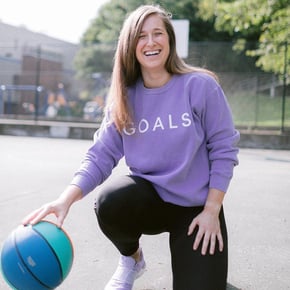.png?width=795&height=415&name=blog%20graphics%20(19).png)
There’s an (un)popular narrative that the women's sports ecosystem has to “prove its worth” before athletes are paid equitably. For years, the conversation around women's sports has followed a frustrating pattern:
“Let’s grow the audience first. Let’s get more sponsors. Let’s build the infrastructure. And then – once the industry is big enough we’ll start paying women athletes more.”
But what if we flipped the script? What if the fastest way to grow women’s sports was actually to pay women athletes more first?
One trend that we’ve seen in women’s sports is women athletes giving and investing directly into the industry. Women athletes get compensated, they aren’t just walking away with the check; they’re reinvesting it, they’re building, and they’re bringing others with them.
As USWNT star and equal pay trailblazer Alex Morgan famously said upon announcing her retirement from professional soccer:
“I think that I’ve found my calling in just investing in women’s sports, doing as much as I can to give as big of a platform to women’s sports as possible.”
And Alex Morgan isn’t just talking the talk, she’s walking the walk. She co-founded TOGETHXR, a media platform dedicated to women’s sports storytelling, coverage, and content. She also created the Alex Morgan Foundation which aims to empower girls and women by creating equity and opportunity in sports and life, and is also an investor in the glass-shattering new women’s 3v3 basketball league, Unrivaled.
Morgan is putting her money and influence right back into women's sports to create more visibility, value, and opportunity.
And the thing is she’s not alone – currently we’re seeing a movement where the top names and earners in women’s sports are investing directly back into the industry. Here are a few key examples - and please note: this is certainly not an exhaustive list. There are countless examples of women athletes investing back into the women’s sports industry through philanthropy, entrepreneurship, team ownership, etc:
- Serena Williams recently invested in the Toronto Tempo, the WNBA’s first expansion team in Canada.
 Source: Toronto Tempo
Source: Toronto Tempo
- USWNT legends Brandi Chastain, Aly Wagner, Danielle Slaton, and Leslie Osborne are founding investors in Bay FC in the NWSL.
- Angel Reese is a founding owner of the DC Power Football Club in the USL Super League.
- Coco Gauff, Dawn Staley, JuJu Watkins, Michelle Wie West and Megan Rapinoe all joined Alex Morgan as investors in Unrivaled.
- …and Parity athletes Batouly Camara, Pippa Mann, Nzingha Prescod have all created philanthropic organizations designed to give back to women & girls in sports.
Sallie Krawcheck, the Founder of Ellevest – which is a leading company when it comes to building and managing women’s wealth – famously said, “Nothing bad happens when women have more money.” These examples prove that when women athletes make money, they don’t hesitate to grow the industry themselves.
 Excerpt of "7 Truths About Women and Money" by Sallie Krawcheck.
Excerpt of "7 Truths About Women and Money" by Sallie Krawcheck.
There’s a saying that we hear from top business leaders all the time: You take care of your people, your people take care of you. It’s basic business logic at this point, and if we’re going to effectively run women’s sports as a business, investing in the talent will lead to greater results. The most valuable asset in women’s sports is the women athletes themselves. They’re the product. The marketers. The community builders. They’re the ones bringing in millions of fans on social media and breaking viewership records. And now? They’re the ones funding the future. And there is no reason to believe this flywheel won’t accelerate, unless we keep holding onto outdated narratives that hold back the very people who have the power & influence to push women’s sports forward.
Give women athletes the resources, respect, and revenue they deserve, and they won’t just benefit individually; the entire industry will. Let’s stop acting like growth has to come before investment in women. The truth is that paying women athletes might just be the best growth strategy we have.
About Caroline Fitzgerald
Caroline Fitzgerald (she/her) is a contributing writer for Parity and the CEO & Founder of GOALS - a women's sports marketing consultancy & media platform. Caroline launched GOALS in 2020 after recognizing that there was an opportunity to help brands, networks and fans see the social and economic value that can come from investing in women's sports. GOALS also produces the leading women's sports business podcast - 🎙️The Business Case for Women's Sports, which is presented by Ally. For more information on GOALS, visit https://goals-sports.com or follow on Instagram, LinkedIn, Facebook, X (formerly Twitter) and Threads.
About Parity, a Group 1001 Company
Minority-founded in 2020, Parity's mission is to close the gender income and opportunity gap in professional sports. By developing high-impact collaborations between brands, professional women athletes and their fans, Parity has proudly put more than $3.5 million in the pockets of women athletes, attracting dozens of brands to the movement in the process. The platform offers connections to more than 1000 women athletes from 80+ sports, including well over 200 Olympians and Paralympians. For more information on how to tap into the rapidly rising influence and popularity of women athletes, visit https://paritynow.co or follow us on Instagram, LinkedIn, Facebook, X (formerly Twitter) and Threads.

-1.png?width=300&name=blog%20graphics%20(19)-1.png)


